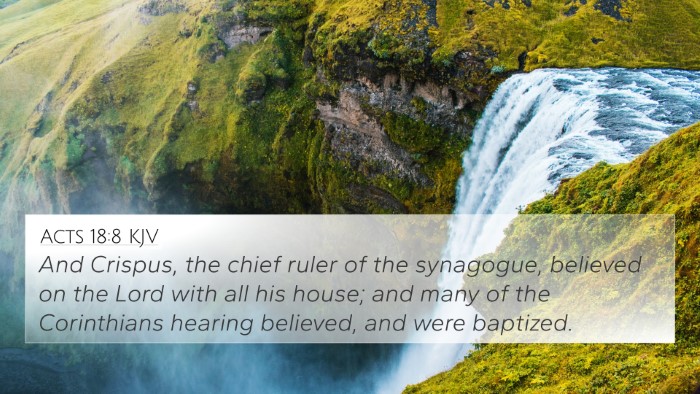Understanding 1 Corinthians 1:14
Verse: 1 Corinthians 1:14 - "I thank God that I baptized none of you, but Crispus and Gaius."
Summary of Meaning
This verse highlights the Apostle Paul's gratitude for the limited number of individuals he personally baptized in Corinth. Paul emphasizes that his purpose was not to create divisions among the believers but to focus on preaching the gospel. By stressing the significance of the message of Christ over the act of baptism, Paul sets the stage for a broader discussion about unity in the church.
Insights from Public Domain Commentaries
Matthew Henry
Matthew Henry remarks that Paul’s statement reveals his intention to minimize personal allegiance to himself and to elevate the central message of the gospel. He notes that while baptism is important, it should not distract from the primary mission of spreading the Good News. Bapism, according to Henry, is a public declaration and an act of obedience, but the focus should remain on the faith that it symbolizes.
Albert Barnes
Albert Barnes emphasizes that Paul's thanking God for baptizing few in Corinth indicates his awareness of the potential of creating divisions among the church members based on their favorite leaders. Barnes explains that the act of baptism should not lead to partisanship, as the essence of Christianity lies in the unity of believers in Christ, rather than loyalty to any human leader.
Adam Clarke
Adam Clarke focuses on the implications of Paul's position regarding baptism. He suggests that Paul seeks to reduce the emphasis on the ritual itself in favor of highlighting the spiritual transformation that baptism signifies. Clarke notes that Paul’s concern was not with the act of baptism in isolation but rather how it can sometimes lead to misinterpretations of faith and cause divisions amongst Christians.
Thematic Bible Verse Connections
This verse serves as a critical point for exploring themes of unity, the nature of ministry, and the correct understanding of Christian sacraments. It invites meditation on how practices such as baptism should be viewed within the larger context of faith and the message of Christ.
Cross-References
- Matthew 28:19-20: The Great Commission where Jesus commands to baptize all nations.
- John 3:5: Jesus teaches about the necessity of being born again of water and Spirit.
- Acts 18:8: Refers to Crispus, who believed in the Lord alongside many others in Corinth.
- 1 Corinthians 3:5-6: Paul discusses the roles of different workers for Christ, emphasizing that God gives the increase.
- Ephesians 4:4-6: Paul urges unity among believers, highlighting one body, one Spirit, one hope.
- Romans 6:4: Baptism as a symbolic act where believers are buried and raised with Christ.
- Colossians 2:12: Relates baptism to faith in the working of God, emphasizing spiritual significance.
Comparative Bible Verse Analysis
When analyzing 1 Corinthians 1:14 in the context of other passages, it is important to note how baptism is treated in different parts of scripture. This verse can be linked to discussions in the synoptic Gospels and the Acts of the Apostles, revealing how baptism played a role in the early church and its significance in the life of believers.
Tools for Bible Cross-Referencing
To gain a better understanding of the way this verse connects with others, utilizing bible concordance or a bible cross-reference guide can greatly enhance one’s study. Tools like these allow for an in-depth analysis of scripture, helping to identify major themes and doctrinal significance throughout the biblical text.
Utilizing Cross-References in Study
When studying the Bible, it’s beneficial to consider how verses interconnect. One can ask questions such as, "What verses are related to 1 Corinthians 1:14?" or "How does this verse connect with Jesus' command to baptize?" These questions facilitate a deeper understanding of Biblical context and theology.
Conclusion
1 Corinthians 1:14 serves as an essential reminder of the unity of purpose among believers, encouraging a focus on the core of Christianity—faith in Jesus Christ—rather than the divisions that can arise from personal loyalties. In studying this verse alongside cross-referenced texts, believers can find encouragement and guidance in their own spiritual journeys.














